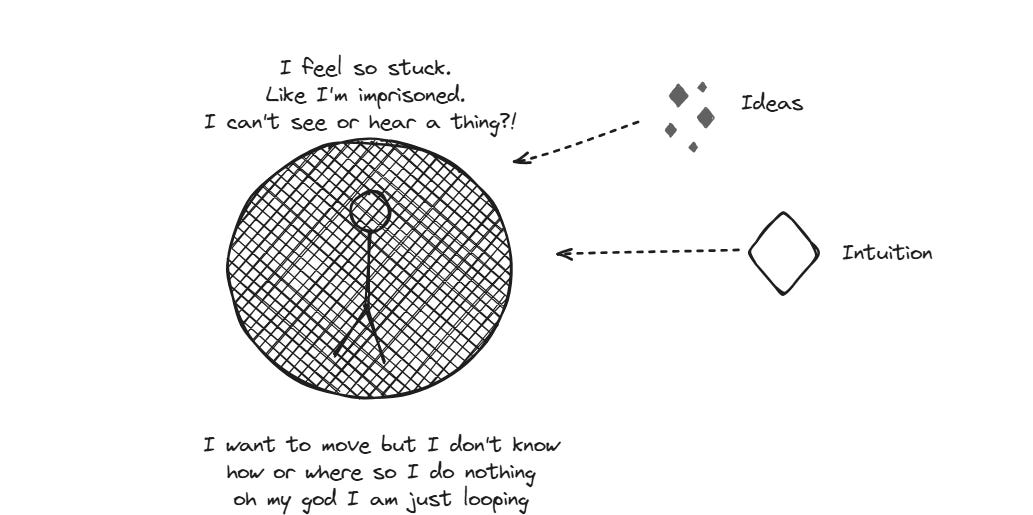When you loop and procrastinate, separate the circumstances from their emotional charge. This is a framework I learned from Mike, a self-made trader.
A month ago, I joined one of those group exercises in which everyone journaled about the new year. It sounded so exciting!
What’s your vision for 2025?
Drum roll.
Nothing.
No, seriously. Absolutely nothing. I stared at the page and… Could. Not. See. A. Thing.
It’s been like this for a while. There’s a kind of event horizon sitting in between ‘me today’ and, like, the rest of my life. There’s a point past which no thought can seem to go, a black hole of paralysis.
That point is — and this is going to sound silly — the end of my lease. May 31, I am out of here.
You see, the building I live in was sold last year and every day there’s a crew here doing renovations. They’re fixing floors and walls, replacing lights and doors. Let’s just say it would not surprise me if rent went up by a lot. Even if it doesn’t, New York City feels basically unaffordable. Which troubles me because I don’t quite know where home is.
And because I’ve turned into such a spiritual cliché, I keep hoping for guidance. Hey, intuition, you got any ideas? Universe, you see this? Help a friend out. What should I do? Where should I go?
But God is no celestial butler and the void of space can be awfully quiet.
So, there was this vast nothingness after May 31. Just thoughts swirling. My survival brain looping. Who gives a shit about the long-term and all this spiritual nonsense? Dude, we’re going to be homeless! Fix this, now. EARN!
This is where Mike blew my mind with a very, very simple idea.
“I slammed two ideas together” he explained:
1) anything my mind is looping on as a “problem” is concealing an emotion I’m avoiding, and then 2) the path forward is moving into the experience it is trying to warn me about in full embodied intensity.
In other words, to exit the prison of a problem, separate what is to be done from what is to be felt.
He learned this from the Samurai who meditated on the fear of death to defuse it. They visualized death in battle — getting pierced by arrows, stabbed, trampled, torn to shreds — until they found “acceptance of death as an inevitable part of life.” Having seen the mental movie many times, they could meet combat with calm and clear-headed focus.
Unlike the Samurai, we learn to “manage our fear.” We miss the message it conceals. “Fear is actually a facade,” Mike noted, that shields us from what feels overwhelming.
Today, death is primarily a metaphor: it is what feels like the end of the world, “the point past which the mind cannot think.” Which brings me back to my lease.
Mike immediately spotted my loop (he would make a good coach!). “Here’s my suspicion,” he told me, “to your internal experience, the following scenarios feel like death.”
And he was right. “Not making it” in NYC, failure in business, failure as a writer, failure with money — these all felt like little deaths, like the end of a life or identity. They led into the caverns where I store icky feelings like shame, embarrassment, and sadness.
Failure is a gate to rebirth. For a new chapter to open, an old one must close. But to see this, we must first give ourselves permission to experience the ending, to grieve, to feel embarrassed or ashamed or guilty or whatever it is. This is true even for individuation, for voluntary growth toward our distinct identity and potential. What one part of us seeks, another may fear like death.1
When you find yourself stuck, unable to develop vision, zoom in on the point where all thought collapses. What really happens there? What emotional charge is contained in that event?
What threatens your sense of self-worth, your status, your peace of mind, your self-image? What is so unimaginable that your mind frantically tries to distract you?
For me:
What if I leave this city like a beaten dog, tail between my legs? What if this was a stupid idea? Writing online? What, are you nuts? What if it’s all a dead end? What if I’ll never be a dad?
It’s a kind of unhappy unboxing of negative loops all coming out of one event — shit, I don’t think I can afford this place right now.
The point is not to ruminate and think in loops forever, but to feel. To meditate on it. To experience it, like the Samurai, until it becomes… okay. Until you can see the loops as fabrications of the mind.
Maybe these things will happen in the future, maybe they won’t.
Even if they do: life will go on.
It sounds simple because it is. It sounds simple because it’s not about thinking or knowing but about holding the experience while it burns its way through your body. Until it’s done.
I’m not saying it’s fun. It’s not. But it does pass.
What happens on the other side?
You are, again, receptive. The static noise disappears.
The voice of intuition can show the next step.
You bump into new ideas, new people. You can move. You feel flow. Then the real work begins.
“A ‘problem’ is only a ‘task’ or series of tasks laced with emotional intensity,” Mike said. “Every single time I would catch my mind labeling a circumstance a ‘problem’ I would stop, find my way to stillness, and probe for the emotional experience I was avoiding.”
It’s that simple and that difficult.
The challenges don’t disappear. Half an hour of meditative journaling won’t magically solve your life.
But problems turn into circumstances. “I see the dishwasher is full. I will take steps to unload the dishwasher,” as Mike put it.
The end of a lease means there are things to organize but there is also a blank canvas with endless possibilities.
The future re-appears and there are lots of things to do.
I can’t think of a better exercise to kick off the year. Good luck.
— Frederik
✍️ Transformative Writing exercise.
Where does your mind seem to get stuck? What have you not been able to tackle, to think past or through? What ‘emotional charge’ is attached to this ‘problem’? What feelings come up?
Take a pen and a blank page. This is your portal.
Put your thoughts on paper and feel into your body. If this happens… If I do… What happens in your body? Where? Where does it lead? What emotion comes up next?
What if the first layer of emotion is a shield, a distraction, a misdirection?
What if the story you tell yourself is a way of avoiding how you feel?
Keep writing, feeling, and giving your inner world a voice.
What is really going on? Allow yourself to experience this fully.
Use different journaling practices, especially the inner dialogue, if you get stuck.
Remain curious, notice, and allow yourself to feel until you can separate what there is to do from what there is to be felt.
When the fear abates, the mind stops looping—it is no longer in survival mode. When the emotions are seen and consoled, all of the things that used to pull the lower self into getting involved simply become things “you see” (as the impartial observer). — Samurai trader Mike-San at Trading from a Place of Being
“Pursuing the things we want necessitates giving up on what we think we should want, thereby renouncing an identity that made us feel safe…” as Elaine Writes put it. “It’s hard not to view that relinquishing as a threat to our sense of belonging, rather than an evolution toward a higher purpose.”







Share this post